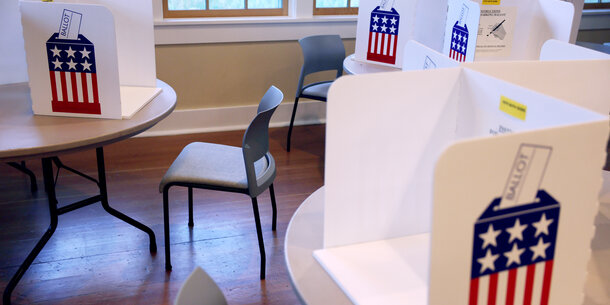Voting in Texas has never been easy.
However, on August 31, 2021, the Texas legislature made it even harder to vote by passing S.B. 1, an omnibus voter suppression bill.
Among other things, S.B. 1 makes it more difficult for voters who have limited English proficiency, disabilities, and/or less formal education to receive assistance with voting at the polling place, curbside, or by mail. S.B. 1 also takes aim at community and faith-based groups by criminalizing non-partisan voter turnout activities as “vote harvesting” and severely restricts election officials by creating a new state jail felony for providing mail ballot applications to eligible voters who do not request them. Additionally, S.B. 1 makes it more difficult for poll workers to preserve order and prevent violence at the polls by limiting their authority over partisan poll watchers. Finally, it represents a backlash against pro-voter innovations in Harris County by banning drive-thru and 24-hour voting.
Our Claims
On September 3, 2021, the Brennan Center and the Mexican American Legal Defense and Educational Fund filed a federal lawsuit in the Western District of Texas, challenging S.B. 1 under the U.S. Constitution and other federal law on behalf of Friendship-West Baptist Church, the Anti-Defamation League, Texas Impact, La Unión Del Pueblo Entero (LUPE), Southwest Voter Registration Education Project, William C. Velasquez Institute, Texas Hispanics Organized for Political Education, Mexican American Bar Association of Texas, FIEL Houston, Jolt Action, Harris County Elections Administrator Isabel Longoria, and James Lewin. (Longoria and her claims were subsequently removed from the case and filed in a separate lawsuit, Longoria v. Paxton.)
Plaintiffs assert that S.B. 1 violates Section 208 of the Voting Rights Act (VRA) because it limits voters’ ability to choose their assistors and the Americans with Disabilities Act (ADA) because it denies equal access to the franchise for voters who have disabilities. Plaintiffs also claim that S.B. 1 violates the First and Fourteenth Amendments because S.B. 1's restrictions on so-called “vote harvesting” criminalize protected speech and are overly broad and unconstitutionally vague. Plaintiffs also allege that S.B. 1’s new restrictions on poll workers violate the Fourteenth Amendment because they are unconstitutionally vague. Plaintiffs further allege that S.B. 1 creates an undue burden on the right to vote in violation of the First and Fourteenth Amendments. Finally, plaintiffs assert that S.B. 1 violates Section 2 of the VRA and the Fourteenth and Fifteenth Amendments because it was enacted to intentionally discriminate against minority voters.
Plaintiffs Friendship-West Baptist Church, Texas Impact, and Jim Lewin are represented by the Brennan Center and the law firm Weil, Gotshal & Manges LLP.
Our lawsuit has been consolidated with five others: OCA-Greater Houston v. Esparza, Houston Area Urban League v. Abbott, LULAC Texas v. Esparza, Mi Familia Vota v. Abbott, and United States v. Texas.
In March 2023, the Harris County Republican Party, Dallas County Republican Party, Republican National Committee, National Republican Senatorial Committee, and National Republican Congressional Committee (Republican committees) intervened as defendants.
On August 17, 2023, the district court granted in part a motion for summary judgment on some other plaintiffs’ claims that S.B. 1’s ID requirements for mail ballot applications and mail ballot envelopes violate the Civil Rights Act of 1964’s materiality provision, which prohibits states from “deny[ing] the right of any individual to vote in any election because of an error or omission…if such error or omission is not material in determining whether such individual is qualified.” The court’s ruling fully resolved the United States’ claims. On December 1, 2023, the state defendants appealed the district court’s ruling to the Fifth Circuit. Oral argument was held before the Fifth Circuit on February 4, 2025, and a decision from the court is now pending.
A bench trial on most of the plaintiffs’ remaining claims began on September 11, 2023, and ended on October 20, 2023. Closing arguments were held on February 13, 2024. There will be a second phase of trial on plaintiffs’ intentional discrimination claims after related appeals are resolved.
On September 28, 2024, the district court permanently enjoined S.B. 1’s prohibition on so-called “vote harvesting,” on the grounds that it violates the First and Fourteenth Amendments of the U.S. Constitution. The court concluded that the law, which imposed criminal penalties on organizers and volunteers who received compensation or “other benefit” and advocated for ballot measures or candidates in the presence of a mail ballot, chilled protected political speech and is unconstitutionally vague. On October 1, 2024, the state defendants and Republican committees appealed the district court’s ruling to the Fifth Circuit, which stayed the ruling on October 15, 2024. On July 1, 2025, the Fifth Circuit ordered that this case be held in abeyance pending resolution of the appeal of the district court’s order striking down voter assistance provisions under Section 208 of the VRA.
On October 11, 2024, the district court struck down several provisions of S.B. 1 that restrict voter assistance as violating Section 208 of the VRA. On October 18, 2024, the state defendants and Republican committees appealed the district court’s ruling to the Fifth Circuit. That same day, the district court stayed its injunction until after the November election. On October 20, 2024, the Fifth Circuit, noting the district court’s stay of its injunction, denied the state defendants’ and Republican committees’ motion to stay the district court’s injunction without prejudice. On April 30, 2025, the Fifth Circuit held an oral argument on the appeal, and a decision from the court is now pending.
On March 14, 2025, the district court permanently enjoined several provisions of S.B. 1 for restricting voter assistance in violation of the Americans with Disabilities Act. Each of the provisions enjoined in this decision were previously enjoined as either preempted by Section 208 of the VRA or as a violation of the First and Fourteenth Amendments. On March 26, 2025, state defendants appealed the injunction to the Fifth Circuit. The district court has since granted a stay of its injunction pending appeal.
Documents
Western District of Texas
- Complaint (September 3, 2021)
- Amended Complaint (December 1, 2021)
- Second Amended Complaint (January 22, 2022)
- Order Granting in Part and Denying in Part State Defendant’s Motion to Dismiss the LUPE Plaintiffs’ Second Amended Complaint (August 2, 2022)
- Summary Ruling on Section 101 Materiality Claims and Order on Pretrial Briefings (August 17, 2023)
- Memorandum and Order Granting in Part and Denying in Part Motions for Summary Judgment Regarding Section 101 Materiality Provision Claims (November 29, 2023)
- Order Permanently Enjoining Section 7.04 (“Vote Harvesting” Ban) (September 28, 2024)
- Order Denying State Defendants’ Motion for Stay Pending Appeal of the Court’s Permanent Injunction as to Section 7.04 (“Vote Harvesting” Ban) (October 1, 2024)
- Order Permanently Enjoining Restrictions on Voter Assistance (October 11, 2024)
- Order Granting in Part and Denying in Part State Defendants’ Motion for Stay Pending Appeal of the Court’s Permanent Injunction as to Restrictions on Voter Assistance (October 18, 2024)
- Order Permanently Enjoining Restrictions on Voter Assistance under the Americans with Disabilities Act and Section 504 of the Rehabilitation Act (March 14, 2025)
Fifth Circuit Court of Appeals (State Defendants’ Motion to Dismiss)
- State Defendants-Appellants’ Brief (December 9, 2022)
- Plaintiffs-Appellees’ Brief (February 8, 2023)
- State Defendants-Appellants’ Reply Brief (March 20, 2023)
Fifth Circuit Court of Appeals (Legislative Privilege)
- Third-Party Legislators-Appellants’ Opening Brief (June 20, 2023)
- Brief for Plaintiffs-Appellees (July 20, 2023)
- Third-Party Legislators-Appellants’ Reply Brief (August 24, 2023)
- Opinion (February 16, 2024)
Fifth Circuit Court of Appeals (Order Permanently Enjoining Section 7.04’s “Vote Harvesting” Ban)
- State Defendants-Appellants’ Emergency Motion to Stay and for a Temporary Administrative Stay (October 3, 2024)
- Republican Party Appellants’ Brief in Support of State Defendants-Appellants’ Emergency Motion to Stay (October 4, 2024)
- Order Granting Temporary Administrative Stay (October 4, 2024)
- LUPE and OCA-Greater Houston Plaintiffs-Appellees’ Joint Response Brief in Opposition to State Defendants-Appellants’ Emergency Motion to Stay (October 8, 2024)
- Republican Party Appellants’ Reply Brief in Support of State Defendants-Appellants’ Emergency Motion to Stay (October 9, 2024)
- State Defendants-Appellants’ Reply in Support of Stay Pending Appeal (October 9, 2024)
- Order Extending Temporary Administrative Stay (October 10, 2024)
- Order Granting Stay (October 15, 2024)
Fifth Circuit Court of Appeals (Order Permanently Enjoining Restrictions on Voter Assistance under Section 208 of the VRA)
- State Defendants-Appellants’ and Republican Party Appellants’ Emergency Motion to Stay and for a Temporary Administrative Stay (October 18, 2024)
- Order Granting State Defendants-Appellants’ and Republican Party Appellants’ Emergency Motion for a Temporary Administrative Stay (October 18, 2024)
- Order Denying State Defendants-Appellants’ and Republican Party Appellants’ Emergency Motion to Stay Without Prejudice (October 20, 2024)
Fifth Circuit Court of Appeals (Order Permanently Enjoining Restrictions on Voter Assistance under Americans with Disabilities Act)
Related Blogs and Reports
- Sean Morales-Doyle, We’re Suing Texas Over Its New Voter Suppression Law, September 3, 2021
- Pastor Danielle Ayers, Faith Compels Us to Act Against Voter Suppression, October 25, 2021
- Kevin Morris and Coryn Grange, Records Show Massive Disenfranchisement and Racial Disparities in 2022 Texas Primary, October 20, 2022
- Leah Tulin and Gabriella Sanchez, Texas’s Voter Suppression Law Is On Trial, September 14, 2023
- Michael Waldman, Voter Suppression On Trial in Texas, September 28, 2023
- Kendall Karson Verhovek, Trial Exposes Harms of Texas Voter Suppression Law, November 3, 2023
- Kendall Karson Verhovek, Closing Arguments in Lawsuit Against Texas Voter Suppression Law, February 15, 2024
- Kendall Karson Verhovek and Jasleen Singh, The Right to Voter Assistance Is Under Attack, February 13, 2024
- Kendall Karson Verhovek, Federal Court Deals Blow to Key Portion of Texas Voter Suppression Law, October 1, 2024

